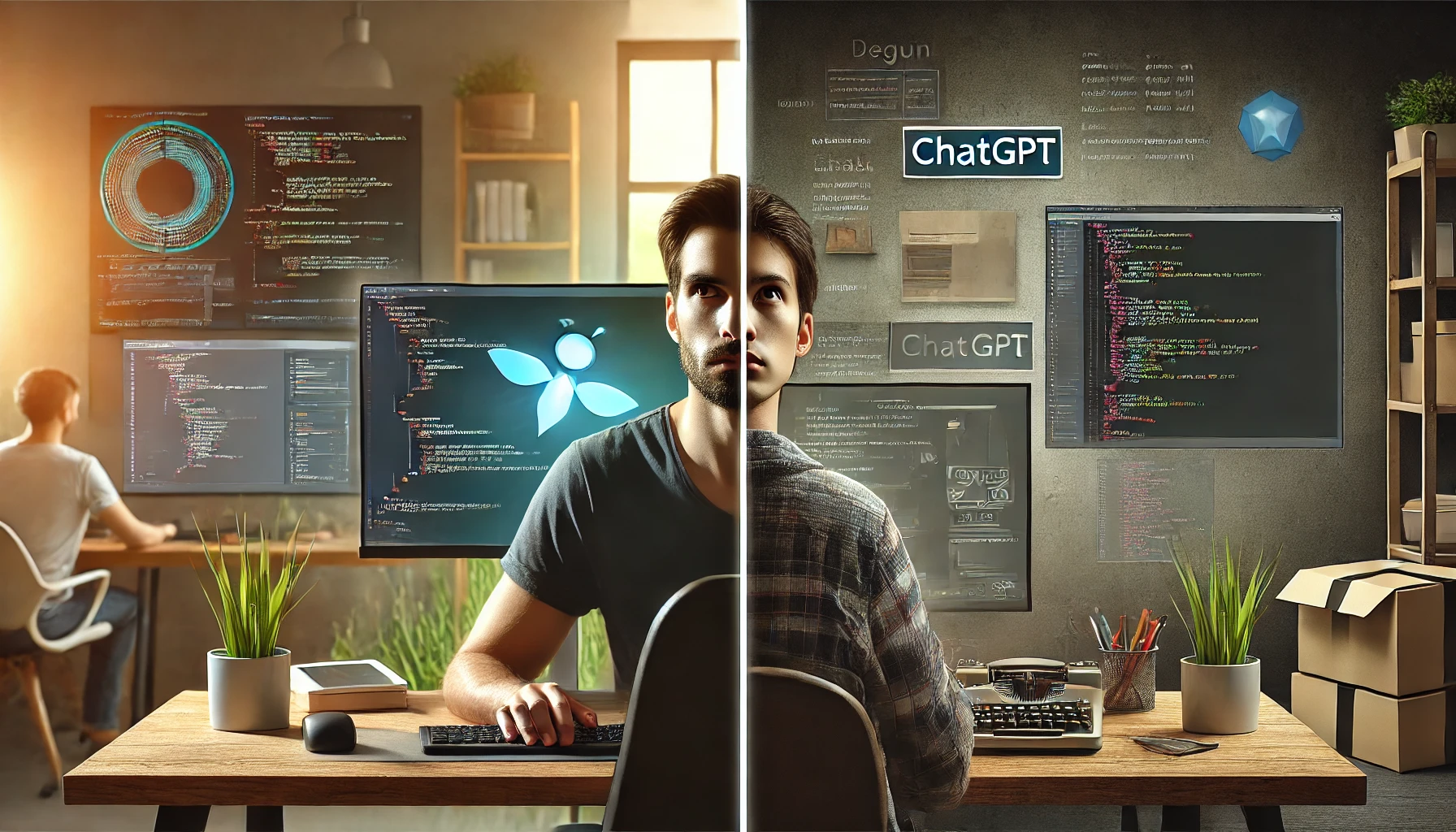ChatGPT's Impact on IT Experts vs Beginners

WebCoder

In the fast-paced world of IT, AI tools like ChatGPT are quickly becoming indispensable. While experienced professionals are finding innovative ways to use these tools to supercharge their productivity, there’s growing concern that for beginners, the same technology might be doing more harm than good. Seasoned pros are leveraging ChatGPT to accelerate their workflows, but freshers? They're often left scratching their heads, missing out on crucial learning experiences that form the foundation of long-term success. Let’s explore this divide and how it’s playing out in organizations like FUEiNT Technologies and beyond.
The Expert Advantage: ChatGPT as a Superpower for Pros
For experienced IT professionals, tools like ChatGPT have become an invaluable asset. These experts, already well-versed in their fields, know how to ask the right questions, interpret the AI's responses, and use the information to complement their own deep knowledge.
Here’s how ChatGPT is transforming the game for seasoned pros:
1. Accelerated Problem-Solving
Experts can approach ChatGPT with highly specific queries. Because they already understand the fundamentals of their work, they can use the AI to cut down on research time. ChatGPT helps them retrieve the relevant data, review code, or summarize documentation quickly, allowing them to focus on implementation.
Example: A senior developer may ask ChatGPT to generate boilerplate code or review a block of code for common issues. Instead of spending hours doing this manually, they get immediate, targeted feedback—boosting efficiency and allowing them to move on to more complex tasks.
2. Enhanced Creativity
Subject matter experts aren’t just using ChatGPT to save time—they're using it to think outside the box. They can brainstorm with the AI, bouncing ideas back and forth to come up with novel solutions or approaches. Because they already understand the nuances of their field, they can filter ChatGPT’s output and spot the gems in the rough.
Example: A seasoned IT consultant may use ChatGPT to generate new architecture ideas or approaches to client challenges, ultimately coming up with innovative solutions they may not have thought of otherwise.
3. Time Management Supercharge
Senior professionals often have an overwhelming workload. ChatGPT helps them streamline processes, whether it’s drafting emails, summarizing reports, or managing administrative tasks. They save hours of manual effort, leaving more time to focus on high-value projects.
Example: A project manager can use ChatGPT to summarize lengthy project updates or help draft meeting agendas, cutting down on the mundane tasks that typically eat up a significant portion of their day.
The Beginner’s Dilemma: Missing Out on the Learning Journey
Now, let’s talk about freshers or beginners entering the IT industry. While ChatGPT can be a valuable tool, it’s also creating some unexpected challenges for this group. The primary issue? Many beginners rely too heavily on AI without truly understanding the intricacies of their field. This can stifle their development and critical thinking skills, which are crucial for growth in a technology-driven industry.
1. Over-Reliance on ChatGPT for Answers
Freshers often find themselves lost in a sea of information. Unlike experienced professionals, they may not have the necessary context to filter the right answers from ChatGPT. They might copy-paste solutions without truly understanding the reasoning behind them, which leads to superficial knowledge.
Example: A junior developer might ask ChatGPT to write code for a simple task but not understand why the code works. Instead of troubleshooting or problem-solving independently, they default to using AI for quick fixes, which doesn’t help them grow as developers.
2. Lack of Problem-Solving Skills
The process of learning in the IT industry often involves trial and error, deep research, and persistence. Beginners who use ChatGPT too early in their careers may miss out on these valuable learning experiences. Instead of wrestling with problems and building problem-solving muscles, they rely on instant answers.
Example: A fresh grad might get stuck on a basic coding error. Instead of trying to debug the issue themselves or seeking guidance from peers or mentors, they turn to ChatGPT for a quick solution. Over time, this behavior prevents them from developing a solid problem-solving framework.
3. Loss of Critical Thinking
For those just starting out, the ability to question and critique solutions is essential. Beginners using ChatGPT might accept the AI’s suggestions as absolute truths without questioning their validity. This can prevent them from cultivating a deeper understanding of their work.
Example: An IT analyst might use ChatGPT to generate reports or interpret data without fully understanding the methodology behind the AI's conclusions. Over time, this blind trust can hinder their ability to critically assess data or develop their own insights.
Bridging the Gap: Can ChatGPT Be a Useful Tool for Beginners?
So, does this mean beginners should completely avoid ChatGPT? Not necessarily. The key is in how it’s used.
Here are some tips for freshers to get the most out of ChatGPT without compromising their learning journey:
1. Use ChatGPT as a Supplement, Not a Crutch
Instead of relying on ChatGPT to do all the heavy lifting, beginners should use it as a tool for guidance. Ask ChatGPT for explanations or suggestions, but take time to research the answers independently. Doing so will help build a more robust knowledge base.
2. Pair AI with Traditional Learning Methods
Beginners should complement AI use with more traditional methods of learning, like reading textbooks, attending workshops, or participating in hands-on projects. AI should enhance their learning, not replace it.
3. Focus on Problem-Solving First
When tackling a challenge, freshers should try to solve the problem independently before turning to ChatGPT. This will help them build resilience and better problem-solving strategies.
Final Thoughts: A Double-Edged Sword
ChatGPT, without a doubt, is a powerful tool that can boost productivity and creativity, particularly for experts who know how to use it effectively. However, for beginners in the IT industry, it can also pose a risk if not used carefully. By over-relying on AI, freshers might miss out on vital learning experiences, slowing their growth and development.
The key for both groups is balance. Experts should continue leveraging AI to stay ahead in their field, while beginners need to ensure they’re still learning the basics and honing critical skills. With the right approach, ChatGPT can be a valuable resource for everyone in the IT industry—regardless of experience level.
FAQs
1. Can ChatGPT replace human professionals in the IT industry? No, while ChatGPT is a helpful tool, it cannot replace the deep problem-solving skills, critical thinking, and creativity that human professionals bring to the table. It can complement their work, but not substitute it.
2. How can beginners balance AI use with learning? Beginners should use ChatGPT as a supplement, focusing on problem-solving independently before turning to AI for guidance. Combining AI with traditional learning methods, like hands-on projects or peer collaboration, can help build a strong foundation.
3. Are there any risks for experts using ChatGPT too much? Yes, even experts need to be cautious. While ChatGPT can save time, it’s essential to avoid over-reliance. Experts should always verify and critically assess AI-generated solutions to ensure they align with the specific needs of their projects.

Vijayakumar Mayilsamy
WebCoder
WebCoder focused on creating seamless web experiences. Expert in WordPress development and bridging the gap between design and functionality.
